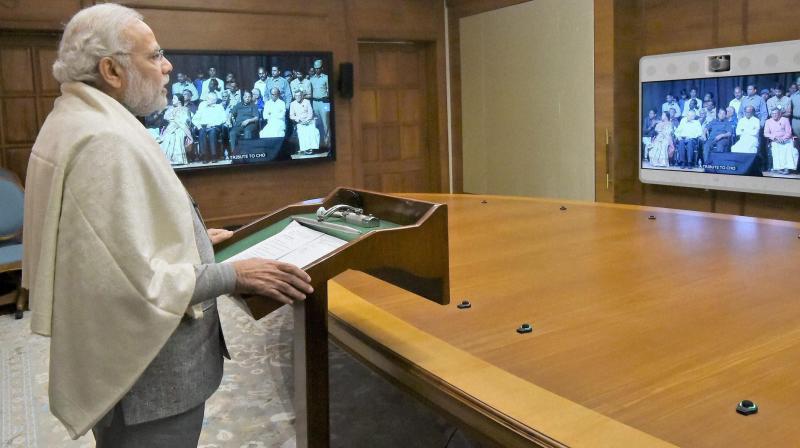PM & Parliament: Some tips for Modi

Narendra Modi made history on May 20, 2014. For the first time, the people of India had elected a prime ministerial candidate who had never been a member of Parliament before.
As Mr Modi entered Parliament for the first time as PM-elect, in a dramatic gesture, he bowed in reverence and touched with his forehead the ground of the steps in Parliament. Later, in an emotional speech, he described Parliament as the “temple of democracy”. It is simply astonishing that the gentleman who had described Parliament as the “temple of democracy”, in just two and half years of assuming office has done everything possible to desecrate this “temple”, to denigrate the institution, and to undermine and subvert its authority.
Parliament is the supreme legislative body in the country, embodying the collective will and wisdom of people in a democracy. The people of India determine and shape the destiny of the nation through their representatives elected directly in the Lok Sabha, and through an indirect process of election in the Rajya Sabha. One of the most important functions of the legislature is to enact and amend laws. The President can promulgate an ordinance when Parliament is not in session, and “immediate action” is needed. The Supreme Court has clarified that the legislative power to issue ordinances is “in the nature of an emergency power” given to the executive only “to meet an emergent situation”. However, the Modi government incessantly threatened the authority of Parliament by attempting to push its way through the ordinance route. As many as 23 ordinances were promulgated in a span of two and a half years. More significant than the numbers is the nature of many of the ordinances.
A prime example of this is the Right to Fair Compensation and Transparency in Land Acquisition, Rehabilitation and Resettlement (Amendment) Bill, popularly known as the land bill that was promulgated thrice as an ordinance.
The original law, affecting 70 per cent population of India, was passed by the UPA-2 government in 2013, after wide-ranging consultations with all political parties, including the BJP.
But as soon as the Modi government came to power in 2014, it severely diluted the law making it anti-farmer and anti farm-labourers.
In its zeal to oblige its corporate friends, Mr Modi and his government killed the spirit of the law and tried to bulldoze its way through Parliament, completely bypassing its authority, by taking the ordinance route repeatedly. However, the bill had to be dropped in the face of a united Opposition.
An act like demonetisation that has affected the 125 crore people of India was taken through a Cabinet decision, issuing an ordinance to this effect only two months after the declaration of the decision. Why were the people’s representatives not consulted before such a major decision? It could be argued that even the demonetisation by the Morarji Desai government in 1978 was brought in through an ordinance. But unlike the 1978 decision, where the higher-denomination notes of Rs 1,000, Rs 5,000, and Rs 10,000 consisted merely two per cent of the currency in circulation, now a staggering 86 per cent of currency had been invalidated.
Unlike 2016, when Rs 500 and Rs 1,000 notes were in possession of every common man; in 1978, Rs 1,000 and higher value notes were almost impossible to possess for the common man given the value of these amounts then. Mr Modi’s disregard for Parliament is indicated by his frequent absence from Parliament and his refusal to speak despite repeated demands from the Opposition. Mr Modi did not speak a word on demonetisation in Parliament, while talking about it outside the House. This is completely against the norms of parliamentary decorum. It is ironical that while the session is on, the PM comments on important issues outside Parliament, but refuses to speak inside it.
Disruptions in Parliament have become a matter of concern for all citizens. It is the responsibility of the incumbent government to ensure the smooth running of Parliament. Progressively over the years, disruptions by Opposition parties have become the practice, though an unacceptable one.
But it’s for the first time in the history of Indian democracy that members from the ruling party disrupted Parliament, showing placards to the Chair. Breaking all norms and decorum, BJP members in the Rajya Sabha started disrupting the proceedings, not allowing Leader of the Opposition Ghulam Nabi Azad to speak. It is utterly shameful that a senior member and a minister from the ruling party branded the Leader of the Opposition as “anti-national”.
An anecdote about Mr Modi’s bête noire, Pandit Jawaharlal Nehru, describes what the founding fathers of parliamentary democracy in India thought about it and how they behaved. Syama Prasad Mookerjee was the founder of Bharatiya Jan Sangh. In the first general election in 1952, the Jan Sangh won three seats, including that of Dr Mookerjee. As per parliamentary rules that allocate time to political parties to speak in Parliament on the basis of the strength of the number of MPs in each party, the time allotted to the BJS was very little. However, Dr Mookerjee participated in every major debate, and often spoke way beyond his allotted time. Once while he was speaking, a Congress member got up and objected to this. Pandit Nehru was present in the House at that time. He told the Congress member: “when you speak, the House listens, when Dr Mookerjee speaks the whole of India listens. Let him speak.” That was the spirit of the day and it shows the respect that leaders had for each other. Mr Modi should learn from his predecessors and teach his party MPs to imbibe this spirit. That’s the greatest homage he may offer to this “temple of democracy”.

